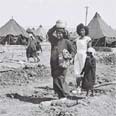
The 'other' refugees from 1948
Jewish communities in the Arab world pre-date the Muslims by hundreds of years, but they were destroyed in Arab backlash to Israeli military victories in 1948 and 67. Now, a new film aims to document their plight
But for Jews living in Arab lands, the problems were just beginning. Across North Africa and the Middle East, more than a million Jews, already living as second-class citizens in hostile nations, were driven into exile after 1948, their property confiscated, their futures uncertain.
About 600,000 went to Israel; the rest scattered across the globe. They are sometimes called the forgotten refugees, but with a new documentary film, surviving Mizrahi Jews hope to be forgotten no more.
"The Forgotten Refugees" is a riveting 48-minute film produced by the David Project and IsraTV. The film is only the latest salvo in an ongoing public-relations campaign from JIMENA (Jews Indigenous to the Middle East and North Africa), an organization that fights to raise public awareness of those refugees and the torment they endured long ago.
"This documentary will spread far and wide," says Joseph Abdel Wahed, an Egyptian-born Jew and co-founder of JIMENA. "Finally viewers will see the other side of the story, a story that has not been told."
Personal interviews, rare footage
"The Forgotten Refugees" blends personal interviews and rare period-footage to recount the long, sad story of the modern Jewish exodus. Moraga resident Wahed is one of several refugees interviewed, all of whom recount similar tales of anti-Semitism and ultimate exile.
Another Regina Waldman, born Regina Bublil in Tripoli, Libya and today a resident of northern California. She is also an outspoken human rights advocate and JIMENA member. "We were indigenous to the region," she says. "We were there over 2500 years ago. We were natives."
Despised minority
As the film reveals, Waldman grew up part of a despised minority in a Muslim nation, yet even today she remembers fondly the sweet smell of couscous cooking on the stovetop.
"I remember going to the beach with my cousins, spending the summers, eating wonderful food," she says. "And yet it is overshadowed by the scary parts: People coming out of the mosques, grabbing any Jewish boy and beating him up. We would run into the stores to hide. That was the way life was supposed to be. I didn't know you could live as a free person."
Her first taste of freedom came when she was 14 during a clandestine trip to Italy to visit her grandmother. "When I realized you could be Jewish and walk in the streets of Rome, I was shocked," she says.
Long drive to freedom
That set the stage for a long drive to freedom, starting with boarding school in Europe and Great Britain. In the early summer of 1967, while Waldman worked for a British firm in Tripoli, the Six-Day War broke out. That victory for Israel spelled big trouble for Libyan Jews.
Recalls Waldman: "Mother called and said, 'Don't come home. The house has been surrounded.'" Angry Muslim mobs burned and looted Jewish homes and synagogues.
It was a tragic moment replicated in hundreds of thousands of Jewish lives throughout the Muslim world.
For Wahed, exile came sooner, in 1952. He, too, grew up in a cultured environment in pre-war Egypt, and also suffered countless anti-Semitic indignities as a youth.
"We always carry some nostalgia for the good old days before 1940," he says. "At that time, things were fairly decent, not because the Arabs loved us but because much of the Arab world had colonizers. In a sense we were protected.
"But it doesn't mean we love the culture. It teaches children to hate Jews."
Wahed benefited from a Sorbonne education, becoming chief economist with Wells Fargo Bank after moving to the United States in 1962. He is now retired, but remains active with JIMENA and the Jewish Community Federation.
Moving on
As successful as he has been in his adopted country, Wahed remains stung by the treatment he and so many other Jews received. "At first I went through anger," he says. "All that's left now is hurt. I don't have any hate, but I hurt that my own (Egyptian) people would do this for no reason. We broke no laws, we committed no crimes."
Waldman feels similar pain. Unlike Wahed who has visited Egypt several times over the years, she is not ready to visit Libya again. But she has worked hard to rid her heart of bitterness.
"I take a strong position against violence and hatred," she says. "It took me several years, until I had my own children, to make peace and forgive the perpetrators."
Wahed echoes the sentiment. Despite the hardships of youth, he is proud of his own success and of the mizrahi (Sephardic) Jews around the world. With the release of "The Forgotten Refugees," he believes others will be, too.
"It's a compelling story, especially when you compare it to the parallel story of the Palestinians. We weren't showered with money from the EU or the U.N. We did it on our own. We rolled up our sleeves, tightened our belts and worked very hard wherever we went."










